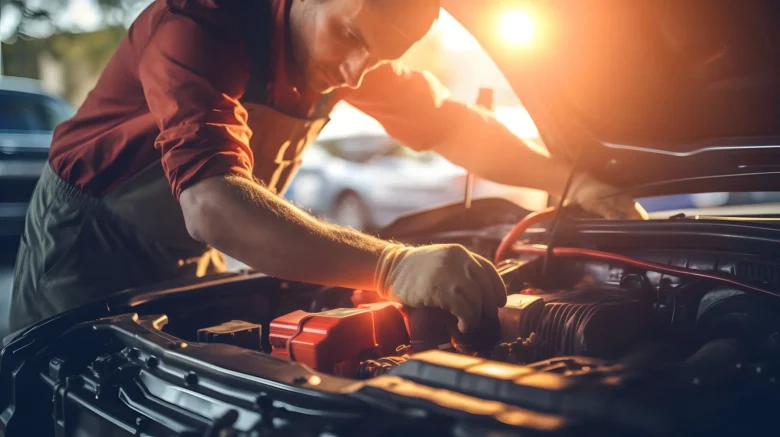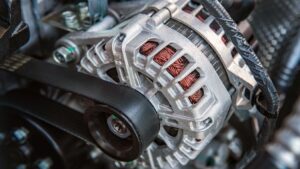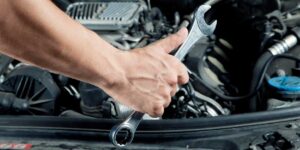Taking good care of your car’s engine is important to ensure that it runs smoothly and lasts a long time. A well-maintained engine uses less gas, runs more efficiently, and is less likely to require expensive repairs in the future. Understanding and performing a few simple maintenance tasks can have a big impact on the health and performance of your car.
1. Change Your Engine Oil Regularly
Changing your engine oil regularly is one of the most basic things you can do to keep your engine in good shape. Engine oil prevents the moving parts of your engine from rubbing against each other and getting too hot. Over time, engine oil breaks down and stops working, which can damage your engine and make it run poorly. Depending on the make and model of your car, most manufacturers say you should change your oil every 3,000 to 5,000 miles. Be sure to consult your owner’s manual for specific instructions and make sure you use the correct oil for your engine.
2. Check and Replace the Air Filter
Air filters are important to ensure that your engine gets clean air for combustion. If the air filter is dirty or clogged, it can block the airflow, causing your engine to run slower, use more fuel, and create more pollution. The air filter should be checked and replaced regularly according to the manufacturer’s instructions, and more often if you drive in dusty or polluted areas.
3. Monitor and Maintain Fluid Levels
In addition to engine oil, coolant, transmission fluid, brake fluid, and power steering fluid are also essential to the normal operation of your engine. Check these fluid levels regularly and add more as needed. Coolant prevents the engine from overheating, and transmission fluid ensures smooth shifting. Fluids that are too low or broken can cause the engine to boil, perform poorly, or even become damaged. Changing these fluids regularly is important to keep your engine running smoothly.
4. Check and Replace Spark Plugs
The spark plug ignites the mixture of air and fuel in the engine cylinder. Worn or damaged spark plugs can cause misfires, slow acceleration, and poor fuel economy. Check the condition of your spark plugs regularly and replace them if the manufacturer specifies it or if you notice a problem with the plug’s operation. When the manufacturer says that replacing spark plugs will keep your engine running smoothly and quickly.
5. Keep the Timing Belt in Check
The timing belt, or timing chain in some cars, is a key component in ensuring that the crankshaft and camshaft rotate together. If the timing belt is not working properly, it can cause serious damage to the engine, causing bent valves or broken pistons. Inspect the timing belt regularly for signs of damage or wear and replace it according to the manufacturer’s instructions. Typically, you should replace your timing belt every 60,000 to 160,000 km. However, this can change, so consult your owner’s manual for exact instructions.
6. Maintain the Cooling System
It prevents your engine from overheating by regulating the temperature. The thermostat, water pump, and heater are the most important components. Check your radiator regularly for leaks, make sure your water pump is working properly, and repair your thermostat if it’s not working. Daily coolant changes and cooling system flushes will also keep your engine at the right temperature and prevent it from overheating.
7. Monitor the Battery and Electrical System
The battery and electrical system are important for starting your engine and keeping your car running smoothly. Check your battery charge regularly and check your connections for corrosion. Make sure your wires to the battery are tight and in good condition. Also, check your generator and starter to make sure they’re working properly. A healthy battery and electrical system will keep your engine running smoothly and starting every time.
Conclusion
By following these engine maintenance tips, you can keep your car running smoothly and reliably. Regular engine maintenance not only improves performance, it also saves you from costly repairs and extends the life of your car. Taking the time to maintain your engine will make driving smoother and more enjoyable while protecting your investment in your vehicle.
FAQs
1. How often should I change my car’s oil?
Typically, you should change your car’s oil every 3,000 to 5,000 miles. Different types of engine oil and the make and model of your car can change the exact time between oil changes. Be sure to consult your owner’s manual for manufacturer’s instructions.
2. How Do You Know When Your Car’s Air Filter Needs to Be Replaced?
If your car’s engine isn’t running smoothly or efficiently, is making strange noises, or has noticeable dirt or debris on the air filter, it may need to be replaced. If you notice any of these symptoms, you should check or even replace your air filter.
3. How Do I Know If My Car’s Spark Plugs Need to Be Replaced?
Poor acceleration, difficulty starting the engine, rough idling, and poor fuel economy are all common signs that your spark plugs may need to be replaced. If these conditions are present, it may be time to check and replace your spark plugs.
4. What Is a Timing Belt and Why Is It Important?
The timing belt is an important part of the engine that allows the crankshaft and camshaft to move simultaneously. This allows the valve to open and close at the correct time. A broken timing belt can cause a lot of damage to your engine. To prevent engine failure, it is important to replace the timing belt according to the manufacturer’s instructions.
5. How often should I check my car’s cooling system?
Your car’s cooling system should be checked regularly, usually every 25,000 to 30,000 kilometers, or as specified in your car’s owner’s manual. Regularly checking the radiator, water pump, and temperature can help prevent your car from overheating and ensure that they are all working properly.
6. What should I do if my machine is making strange noises?
If your engine is making strange noises, such as banging, knocking, or grinding, you should have your car inspected by a professional mechanic immediately. These noises can be signs of deeper problems that need to be addressed immediately to prevent further damage.




